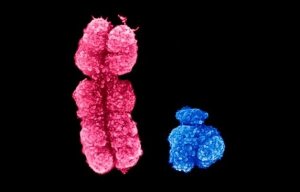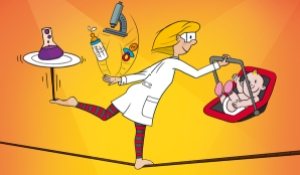We have it wrong in STEM
Yesterday was the international day of women in science. Truth be told, I only found out when I saw tweets with the hashtag flooding my feed. Part of me got hyped and very excited – you know – being a scientist and a woman. And then it got me thinking – why? We shouldn’t be excited about having to still fight for noble causes we have been fighting for decades or even centuries. Not in a day and age when we consider our society advanced and evolved beyond inequality! But the truth of the matter is – inequality is ever so present, despite the fact that our legislation might not be ingratiating it. The sciences (or STEM) are one of the areas we haven’t been doing too well with overcoming it.
 Stats for the win!
Stats for the win!
According to the National Girls Collaborative Project, more than half of the bachelor degrees in all fields have been awarded to women which is fairly normal – girls too want to study and get a higher education. But then, just few years later down the line fewer than one in four women is a professor. While it’s perfectly normal that not everyone with higher education becomes an educator themselves, such a discrepancy at the “higher floors” of academic hierarchy is puzzling to say the least. Naturally, one of the most obvious arguments for the persistence of gender inequality in STEM is the simple count of female scientists who “made it”, compared to the number of successful males. If you are in grad school or a postdoc, just think of the gender ratio among PIs in your department. Chances are that you too, like me throughout my academic career, have been more often than not in male-dominated departments. And there are many objective reasons for this, but there are even more subjective ones.
Heads and tails
Unsurprisingly, there have been so many campaigns and efforts to bring to the forefront the gender bias in many STEM fields and do something about it. Wherever you look, if you look at all, there are “Female in science” inspired programs, grants, movements. One (nonexhaustive) list to start with is the AAAS Grants for women in Science. Hollywood too is gradually boarding the “fashionable to have a smart girl in the production”-train.  We get to hear more and more female names (living and deceased) being praised for their contribution to science. Publishing houses are rushing to sing the unsung superheroines of science, and even smaller projects aim at paying the dues to female scientists. A friend of mine – Julia, has recently been editing a book called “The female founders” (to be published in German later this year and in English hopefully in the beginning of 2018). The zeal with which bigger and smaller projects pay homage to female scientists is admirable and to be supported by all means possible.
We get to hear more and more female names (living and deceased) being praised for their contribution to science. Publishing houses are rushing to sing the unsung superheroines of science, and even smaller projects aim at paying the dues to female scientists. A friend of mine – Julia, has recently been editing a book called “The female founders” (to be published in German later this year and in English hopefully in the beginning of 2018). The zeal with which bigger and smaller projects pay homage to female scientists is admirable and to be supported by all means possible.
But isn’t it too little too late? Haven’t we already imprinted firmly in both boys’ and girls’ minds that unless you are willing to give up your all, you probably are not a girl for a STEM project? We’ve gotten to the point when, I as a scientist and a female, am thinking “Oh come on – if you really want it you can be a full professor and the fact that you are not going for it full on, means that you are looking for excuses”… (I do slap my metaphorical hands every time I catch myself thinking this fyi) Isn’t it also becoming counterproductive – “the department is dedicated to hiring a new PI and this time we will appoint a female”. If it was me I would always wonder – was I the best candidate really, or was I chosen for my ovaries and how long will this hold?
Science or death
Many women argue that the selection for tenure track positions is (may be unconsciously) biased towards “individuals who won’t have to be absent for childbearing purposes”. And while this is of course never explicitly said, it known to have been bluntly admitted, off the record, in the process of selection to female candidates of fertile age. This of course is absolutely despicable, but… Part of me understands the reasoning behind it. Imagine you are a fresh-out-of-school master student and all you want to do is dive into that PhD program with this amazingly promising new professor with a start-up grant for 5 years. You start, you work your behind off, hopefully you get good mentoring from your promotor (consider yourself lucky at this point, and this has nothing to do with the gender, believe me, and it’s also a topic for another post). Things are progressing and at some point you hear that your professor will be taking a leave because they are expecting and being in this chemical-rich environment your lab is strictly ill-advised.

Your professor puts all the good will and effort into mentoring you throughout their pregnancy and maternity leave, and may be they succeed and you finish in time. But may be, their partner is just as much career driven as they are, and there just isn’t much time nor stamina left from taking care of a helpless baby, to take care of a misguided grad student. Things drag along, you might get fed up and quit, or not be able to deliver and drop out of your program… It is going to me by inevitably more expensive for a new grad student to pick up your work, with their own funding. So if you decide to stick around for longer until you catch up on your own or your PI comes back from their leave you probably will need longer than usual to finish your degree, and you’ll need to be paid for that time too (at least in Europe you get paid for being a PhD student). And when funding for science is not growing as the demand for it or is even being cut, such spending is probably frowned upon by funding agencies. And hence, many women get turned down for the sole possibility of having children, or they themselves decide to postpone starting a family for a time when their position is secured (a time that might as well never come).
Many will argue that this is one specific case and that women are more than able to multi-task and prioritize, and my argument is not contradicting this. I am only saying that having children does require a lot of effort, does take up a lot of time, and it is virtually impossible to spare the time the family requires and for both parents to pursue demanding careers at the same time. One will have to sacrifice on either the family or the job for it to work. Is it acceptable to expect such sacrifice from either gender is something that is mostly a matter to personal convictions. I don’t believe there’s one correct stand on this.
But lest we forget that science is (probably) equally demanding in terms of dedication, time and effort as raising a child. In fact, I dare argue that science should be as selfless and as enriching endeavor for neither is done right without sacrifice, devotion and often tears and self-doubt.
Not a feisty feminist
I am the last to actively think of feminist values, I mostly live my life and expect the respect I deserve irrelevant of my skin color, gender or life-views. It is probably easier for me to do that as being Caucasian, straight, and living in the western world. But I’ve experienced my share of bias on various grounds – we humans are incredibly creative in finding grounds to divide each other over. Nonetheless, I do consider science in itself gender-neutral and I hope to one day wake up to this phenomenon standing strong as a pillar of our progress. I long the day to not get overly excited that it’s the international day of women in science, because by then it will be irrelevant. Whether this will happen in my lifetime, I don’t know. What is the way to making it happen? I wish I knew! But as long as we keep the dialogue going, we have a measurable chance of getting it right eventually.
